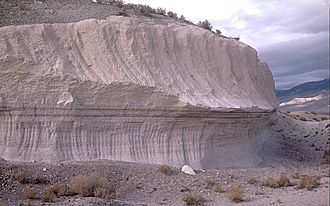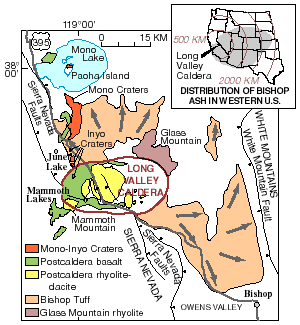Bishop Tuff facts for kids
Quick facts for kids Bishop eruption |
|
|---|---|

Two layers of the Bishop Tuff: lower layer was from ashfall, upper layer was from the main pyroclastic flow.
|
|
| Volcano | Long Valley Caldera |
| Date | 767,100 ± 900 years ago |
| Type | Ultra-Plinian |
| Location | California, United States 37°43′00″N 118°53′03″W / 37.71667°N 118.88417°W |
| VEI | 7 |

Map of the Long Valley Caldera, with Bishop Tuff outlined.
|
|
The Bishop Tuff is a special type of rock. It formed about 767,100 years ago. This happened during a giant volcanic eruption. This eruption created a huge bowl-shaped hollow called the Long Valley Caldera. The Bishop Tuff is made from super-hot ash and rock pieces. These pieces flowed very fast like a cloud. This type of flow is called a pyroclastic flow. Over time, these hot pieces stuck together. This formed a strong, welded rock. You can find large amounts of this rock in Inyo and Mono Counties, California, United States.
Where to Find the Bishop Tuff Today
The Bishop Tuff covers a large flat area. This area is like a high tableland. It is found in the northern Owens Valley in California. You can see it east of U.S. Route 395. It is also west of the Nevada state line. This area sits northwest of Bishop. It is southeast of Crowley Lake and Mammoth Lakes.
Another part of this rock flow is south of Mono Lake. It also surrounds the Mono–Inyo Craters. These are a chain of small volcanoes.
Size and Shape
The Bishop Tuff covers a huge area. It spreads over almost 2,200 square kilometers (about 850 square miles). That's bigger than many cities! The rock layers are also very thick. They range from 150 meters (about 490 feet) to 200 meters (about 650 feet) deep.
The Owens River flows through this rocky tableland. This tableland is a main part of the Bishop Tuff. The river has cut deep into the rock over many years. This cutting has created a deep canyon. It is known as the Owens River Gorge.
 | Toni Morrison |
 | Barack Obama |
 | Martin Luther King Jr. |
 | Ralph Bunche |

